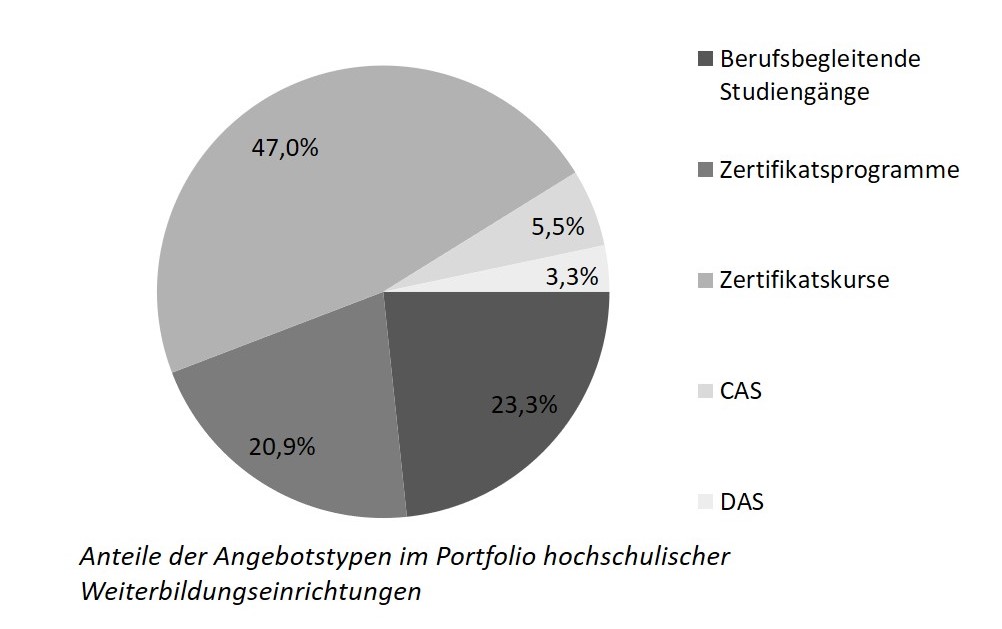
There has been for some time a trend towards shorter certificate courses and programmes in academic continuing education. Until now, however, there had been no national figures enabling us to draw more accurate conclusions on the extent of such short formats in the portfolio of courses offered by universities’ institutes of continuing education and on potential displacement effects on executive degree programmes. This gap has now been closed by a study published by CHE in the context of scientifically accompanying the joint Federal Government-Länder competition “Advancement through Education: Open Universities”. It was found that short formats now account for around three quarters of the portfolio of courses offered by universities’ centres for continuing education in Germany.
One finding of the study was that time and cost savings are the main reasons for the boom in shorter academic training formats. Instead of enrolling on a degree programme for several semesters, entailing longer-term commitments, participants – most of them in employment – can strategically pursue continuing education by taking manageably short courses. This is particularly the case for people who already hold a university degree and do not need another Bachelor or Master’s title to develop professionally.
The investigation focuses on four types of short format that have distinctly gained ground in academic continuing education recently:
- Certificate course: a module at Bachelor or Master’s level that concludes with a certificate awarded by the executing HEI.
- Certificate programme: a unit comprising a coordinated combination of several modules, which concludes with a certificate awarded by the executing HEI.
- Certificate of Advanced Studies (CAS): a continuing education programme based on the Swiss model, lasting up to one year, which concludes with a certificate awarded by the executing HEI.
- Diploma of Advanced Studies (DAS): advanced continuing education based on the Swiss model, lasting between one and three years, which concludes with a certificate awarded by the executing HEI.
The results reveal that short formats now make up around three quarters of the portfolio of courses offered by universities’ centres for continuing education. Executive degree programmes account for 23.3 per cent (see diagram). Certificate courses represent the largest group (47 per cent), followed by certificate programmes (21 per cent). The relatively new short format based on the Swiss model, which is particularly common at HEIs in Southern Germany, does not yet feature highly in the statistics (5.5 per cent for CAS and 3.3 per cent for DAS).
Proportion of course types in the portfolio of universities’ institutes of continuing education:

Online survey of persons responsible for universities’ centres for continuing education, conducted by the CHE Centre for Higher Education in 2019.At the same time, the findings also show that short formats are often integrated into postgraduate education programmes. The majority of executive degree programmes are now based on a modular system, enabling interested individuals to tailor their own package from the single elements on offer. This results in a high degree of flexibility: participants can decide whether they want to take stand-alone certificate courses or earn an entire degree programme, depending on their needs. In many cases, postgraduate education programmes and short formats therefore prove to be complementary types of programmes that give the increasingly diverse target audiences the flexibility they need to pursue academic continuing education in Germany, also embracing a more dynamic range of qualification requirements.
The data originates from several staggered surveys, revealing developmental trajectories over several years in some places. Some of those surveyed were project leaders and project coordinators in the context of the joint Federal Government-Länder competition “Advancement through Education: Open Universities”, whose main responsibilities included the development of innovative academic continuing education programmes. Other respondents included heads of universities’ institutes of continuing education in Germany and individuals responsible for continuing education programmes at German HEIs. A multidimensional comparison between different types of short format and executive degree programmes enabled an in-depth analysis of credit points, level of study, target audiences and specialist orientation.
Alongside FernUniversität in Hagen, the University of Oldenburg and TU Dortmund University, CHE has been a member of the team that scientifically accompanies the joint Federal Government-Länder competition “Advancement through Education: Open Universities” since 2016. In this capacity, CHE is responsible for the “heterogeneity of target audiences” research area. For more information, visit the website of the accompanying scientific research team at https://de.offene-hochschulen.de/start/start
